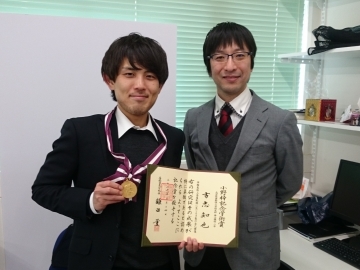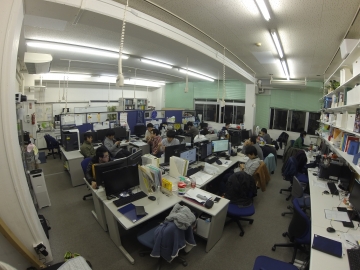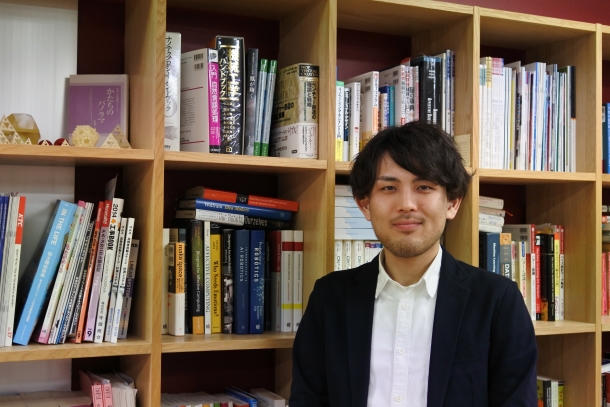
Tomoya, Koshi. 2nd year PhD Candidate of the Graduate Program for Embodiment Informatics, School of Fundamental Science and Engineering
Tomoya Koshi’s research revolves around developing ways for electrical wire to repair itself when cracks occur. He is currently working on developing actual devices based on his research.
His research won him the Young Fellow Excellent Presentation Award at the Symposium on Micro-nano Science and Technology 2015 organized by the Japan Society of Mechanical Engineers. Bringing his research out of Japan, Tomoya presented them at the 30th IEEE International Conference on Micro Electro Mechanical System (MEMS 2017), drawing attention from around the world. In an interview with Koshi, he shared with us his research and future research plans.
Could you tell us more about your research?
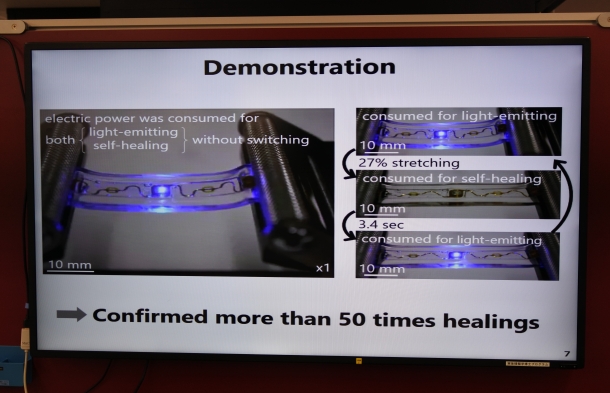
An illustration of how self-repairing electrical wiring works
To summarize my research, it is basically about the “Automatic Repair of Electrical Wires.” Imagine what will happen when you use a power cable of your smartphone after an extensive period of time. The cable would eventually bend and become hard to manage. In order to improve the problem, past researches have focused on studying shapes or structures of the wires to find out which shapes best resist bending, or developing new materials that offer greater elasticity for making wires. However, these solutions could only slow down the process, and the cables would still eventually bend. As such, I decided to work on developing solutions that are more permanent where wires in the cables could automatically repair themselves. Come to think of it, I am been working on my research since 5 years ago when I joined Dr. Iwase lab.
Could you share with us some of the obstacles and challenges you faced when you were doing your research?
I am someone that do not give up and will give out all I have once I get engrossed with something. When I first started on my research, I had problems trying to validate if the wires were actually repairing themselves. A lot of trial and error was involved and I just had to keep trying and make changes accordingly. Furthermore, I was the pioneer batch of the lab I belonged to so I had to start many things from scratch – from brain storming of research ideas to creating samples for experiments – and they were not easy. Nevertheless, it was a great experience and I really enjoyed the whole process.
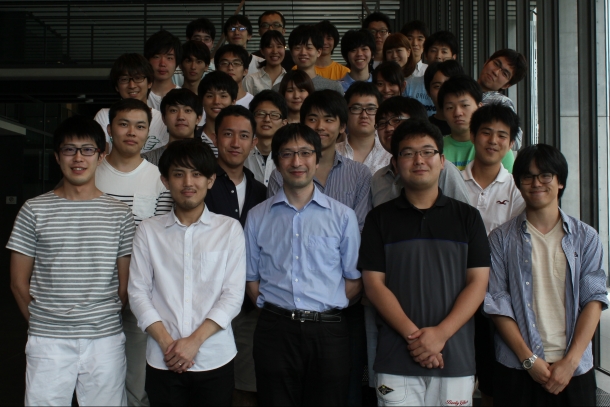
Members of Dr. Iwase’s Lab. (The person in the middle of the front row is Dr. Iwase. The person to his left is Koshi)
Tell us why you decided to major in Applied Mechanics and Aerospace Engineering.
I have a love for monozukuri (making or building things) and I really like building block toys and plastic models. I remember I used to make toys using used milk cartons and newspapers and play them with my friends. While I have always known that I want to study something relating to monozukuri, I actually did not have a specific major in mind that I want to pursue when I entered University. As such, I really like the curriculum at the School of Fundamental Science and Engineering (FSE). At FSE, all students will only declare their majors at the end of first year after reading modules that teaches the basics and fundamentals knowledge. What interests me the most during my first year of study was Applied Mechanics and Aerospace Engineering and this is why I became a major.
I understand that you joined the Graduate Program for Embodiment Informatics after you completed your undergraduate studies. Can you tell us more about it?
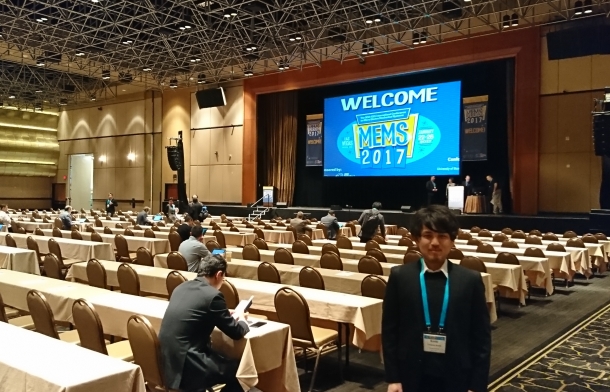
Koshi gave a presentation in English at an international conference in Las Vegas, January 2017.
When I was an undergraduate, I was more interested in the designing stage in which you come up with plans, drawings and blueprints. But after I joined the graduate program, I became more interested in research itself where you validate your research. This makes me want to pursue a PhD under the Graduate Program for Embodiment Informatics and work in the field of research development in future.
In today’s world, when you want to develop a device or system, you can no longer work with just the people within your field. There is a need to seek opinions from people of different background, be it in terms of specialty, culture or language.
In my graduate program, I have many opportunities to interact with people from different areas of expertise. I feel that these experiences will make me a person with T-shaped skills, having exposure to different fields of expertise while being an expert in my own field. At the same time, there are many workshops where researchers and professionals from companies come together. These opportunities kept me informed of what is happening in the real world and allow me to develop better communication skills.
- Dr. Iwase and Koshi. Koshi won the Vaseda Universitas Palam in Memoriam Azvsaono Award (Latin) by Waseda University in 2015
- Laboratory on Nishiwaseda Campus
Lastly, could you share with us your future goals and research plans?
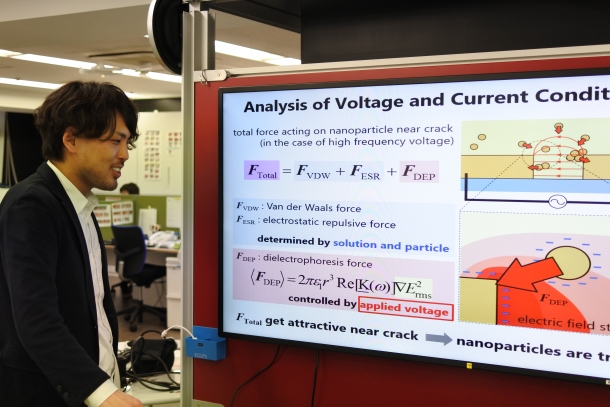
Koshi giving a presentation on his research
My research has now come to a stage where I am developing actual devices. At the moment, I am developing an automatic self-repair wiring system in devices with only very simple construction, but I hope to further develop them into something more complex in the next two years.
Starting April this year (note: this interview was conducted in March 2017), I am working as an intern at Fraunhofer Institute for Reliability and Microintegration IZM based in Berlin, Germany. The institute is leading research organization and I am looking forward to learning new things which I can apply to my own research.
I really hope that my research does not stop at the research phase but could move on to the development and production phase as I really want people to use products that are developed upon my research. I will study and work really hard to become an influential researcher in the production industry.
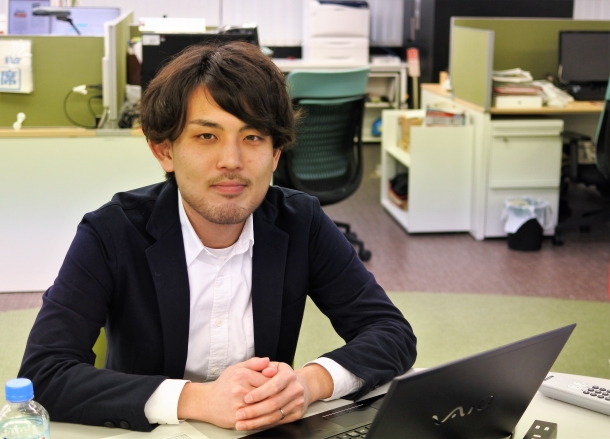 Profile
Profile
Born in Fukushima, Koshi is a PhD candidate of the Graduate Program for Embodiment Informatics, School of Fundamental Science and Engineering . He is also a member of the Research Fellowship for Young Scientists of the Japan Society for the Promotion of Science. He was awarded the Young Fellow Excellent Presentation Award at the Symposium on Micro-nano Science and Technology 2015 organized by the Japan Society of Mechanical Engineers, and Vaseda Universitas Palam in Memoriam Azvsaono Award (Latin) by Waseda University in 2015.
Koshi also plays the guitar and he used to be a member of the band club in Waseda University. His favorite guitarist is Eric Clapton from the U.K.



